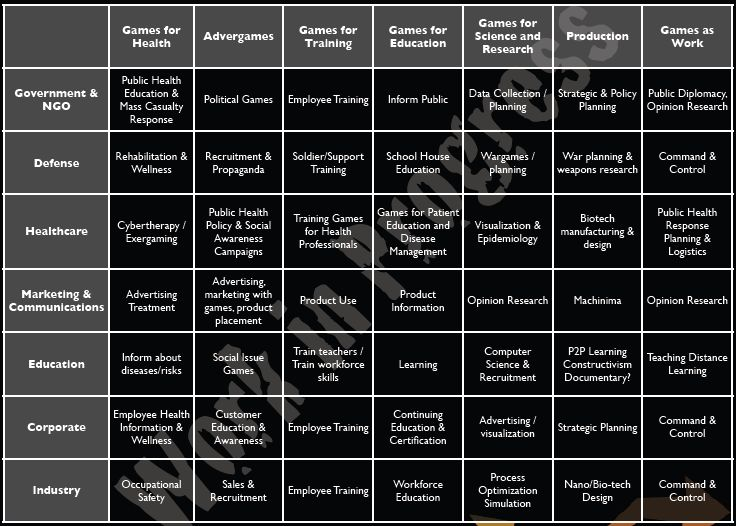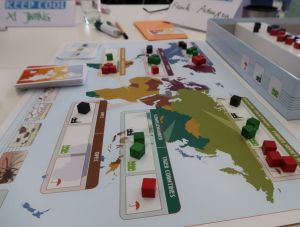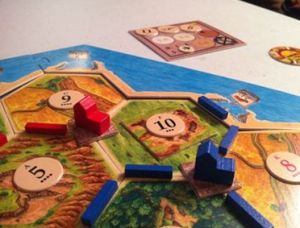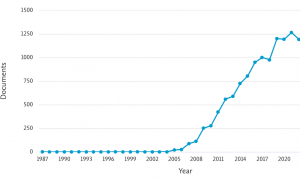Difference between revisions of "Serious Gaming"
| Line 98: | Line 98: | ||
* The ESPREssO project, which included a board game on disaster risk reduction and climate change adapation, is described [https://cordis.europa.eu/project/id/700342 here]. | * The ESPREssO project, which included a board game on disaster risk reduction and climate change adapation, is described [https://cordis.europa.eu/project/id/700342 here]. | ||
* [https://mfl.cls.rwth-aachen.de/cms/cls-mfl/services-und-projekte/~wrdko/serious-games/?lidx=1 Some information] (also in German) on serious gaming projects by RWTH Aachen. | * [https://mfl.cls.rwth-aachen.de/cms/cls-mfl/services-und-projekte/~wrdko/serious-games/?lidx=1 Some information] (also in German) on serious gaming projects by RWTH Aachen. | ||
| − | * [https://www.youtube.com/watch?v=dE1DuBesGYM Ted Talk] on how gaming can make a better world (Jane McGonigal) | + | * [https://www.youtube.com/watch?v=dE1DuBesGYM Ted Talk] on how gaming can make a better world (Jane McGonigal). |
| − | * [https://games4sustainability.org/gamepedia/ Gamepedia] with games for sustainability | + | * [https://games4sustainability.org/gamepedia/ Gamepedia] with games for sustainability. |
---- | ---- | ||
[[Category:Qualitative]] | [[Category:Qualitative]] | ||
Latest revision as of 09:03, 9 May 2025

Quantitative - Qualitative
Deductive - Inductive
Individual - System - Global
Past - Present - Future
In short: Serious Gaming involves games, i.e. interactive analogous or digital formats, that harvest or create knowledge within a game setting with stakeholders.
Contents
Background
"Gaming has roots in systems analysis, operations research and decision sciences. The earliest use of gaming in support of decision making are in war games (...). They have a long history and originated as devices for planning military operations (...). The use of gaming in a political-military-security context was subsequently transferred to a non-military context, hence the interest in gaming simulation by not only computer scientists and game designers, but also decision makers, public policy makers, engineers and scientists." (Savic et al. 2016, p.457). Serious Games are a form of gaming and thus located within the field of simulation and gaming research, alongside other aspects such as computer simulations, agent-based modeling, role-plays and virtual reality (2). "The notion of serious gaming was introduced by Abt (1970), who established how simulation games could be used for education, decision making and for public policy making." (Savic et al. 2016, p. 457, emphasis added). Since Abt's primary work, the method has found its way into several fields, including business, corporate, healthcare, government, military (among these the RAND corporation who invented the Delphi Method) and science (1, 2, 8). However, its primary usage is for education, training and conflict resolution (1, 5).
What the method does
"[A game] is almost impossible to define, but we recognize one when we see it." writes Crookall (2), citing the philosopher Wittgenstein. This statement highlights that there is a wide, unanimous range of definitions for the term 'game', and subsequently for the term 'Serious Gaming'. However, most of the existing definitions agree upon the aspect that "(...) they are games used for purposes other than mere entertainment." (Savic et al. 2016, p.457). Different from most popular video games, entertainment is not the primary goal of a (serious) game, but rather a means to an end (4, 5, 8). A Serious Game pursues a specific purpose that lies predominantly in training, educating and achieving behavioral change in the players (4, 5). Specific goals can be, among others, raising attention, challenging prejudgments, communicating political statements or merely offering information, all of which shall impact the players' lives beyond the gaming experience itself (4, 5). For decision makers and planners as well as scientists, Serious Games can be helpful tools since they "(...) provide a means of identifying and evaluating the consequences of alternative plans and policies." (Mitgutsch & Alvarado 2012, p.11).

- Games differ from simulations. While a simulation is a "simplified, dynamic and accurate model of reality" (Coovert et al. 2017, p.5 citing Adroitly), a game is a "ficticious or artificial situation in which the player is expected to perform" (ibid). The Serious Game may be seen as a combination of both forms: the simulation model no longer focuses on system analysis, but instead serves a learning purpose, adds the player as an actor amongst the other stakeholders, allows for interactive engagement with the model and is used in several different groups (3).
- While games meant something different when Abt first defined the term, today, a 'game' mostly refers to a computer technology or video graphics based experience (2, 5). A Serious Game is a "playful environment" (Mitgutsch & Alvarado 2012, p.122) and more than the hardware or software it is based on, but rather the overall experience the player has while interacting with it (5). Relevant elements of a Serious Game include its purpose, its mechanics and rule-sets, fiction and narrative, its aesthetics and framing and its content (4). Also, debriefing at the end of the gaming experience (i.e. summarizing and reflecting upon it) is a crucial yet often neglected aspect of (Serious) Gaming (2).
- The term 'serious' is debated, but reflects the usage of a (video) game for purposes other than pure entertainment (2). According to Abt, the term relates to "matters of great interest and importance, raising questions not easily solved, and having important possible consequences" (Abt 1970, p.10).
- To be a proper tool for research, a Serious Game must have a) a valid representation of the real-world phenomenon of interest, b) a pedagogical component, and c) a gamification aspect that incentivizes and motivates the players (5). It can then be used as a form of qualitative data gathering where several stakeholders are brought together in a workshop format. In this workshop, the game helps them state problems (e.g. land-use conflicts), but also learn about the underlying issue and develop visions as well as shared solutions.
Strengths & Challenges
-
In general, positive impacts of games include analytical and spatial skills, strategic planning skills, better orientation in three-dimensional spaces, psychomotor skills, learning capabilities and more (8). When applied as a tool for planning and education, further advantages include:
- Serious Gaming, compared to purely technical simulations, better acknowledges socio-technical challenges of complex systems (1).
- "Serious games combine the analytic and questioning concentration of the scientific viewpoint with the intuitive freedom and rewards of imaginative, artistic acts" (4, p.12)
- Games are motivating forms of education and training and allow the players to receive feedback on their actions. They provide a safe environment for experimentation by allowing players to try out various strategies without real-world consequences (7, 9). Moreover, serious games enable the evaluators to easily assess the players' performances and provide more creativity for the game designers without having the associated risks of implementing the simulated decisions in the real world (4).
-
More specifically, Serious Games may be an effective tool for research purposes (especially for research teams):
- they offer flexible and consistent data gathering,
- they enable teams to easily distribute new information within the team and provide feedback to the team members' reactions to this information, and
- they facilitate debriefing (all from (5)).
- However, there is currently still a lack of research on whether these alleged advantages really translate into practice (see Outlook).
- Despite their great potential, serious games are not without limitations:
- Simplifying complex issues can limit the transferability of skills to real-life situations (10).
- Game development can be costly and time-consuming, demanding significant expertise from game designers (11).
- Serious games may not always be inclusive, potentially falling short in addressing the diverse needs of all players (12).
Normativity
- Serious Gaming may be built upon other methodological approaches, such as Geographical Information Systems or forms of System Analysis, including Social Network Analysis or Causal Loop Diagrams.
- Serious Gaming may be used as a transdisciplinary research method in stakeholder workshops. Thus, all notions of normativity in transdisciplinary research may apply, such as conflicting roles and challenges in problem framing.
- It should be noted that the educational purpose of Serious Games attributes an important role of the method in the normative field of Sustainability Science. The information and framing that are part of the game serve a specific purpose, which may represent unanimous positions within the sustainability community, but may as well inflict opposing and harmful moral positions. The knowledge transported within a Serious Game should be fact-based, whereas the scope and direction of framing depends on the underlying purpose of the game which is contributed by the originator of the game (a company, an NGO, a government, an academic actor...). No matter the specific framing, this should be reflected upon when creating the game and assessing its effects (see (3)).
Outlook
- As a scientific method, Serious Gaming has existed for over 50 years now, but there is still a lack of a homogeneous usage of the term, with common alternatives being 'digital learning games', 'game-based learning' or 'edutainment games', among others (2, 8). However, as Crookall (2) hopes, this ambiguity should not halt the further development of the method. He claims that the field of simulation and gaming may be moving towards being a full scientific discipline rather than only a set of methodological approaches (2). While the usage of Serious Games is currently widespread across different disciplines, a suggested name for the discipline-to-be is "Game Science" (5).
- A relevant issue is the additional lack of research on the actual effectiveness of simulations and games in the respective fields of application (2, 4, 8). Reviews point out either a lack of proper evaluation (such as small sample sizes and lack of control groups) or unclear assessment outcomes (such as demonstrating the benefits of serious games only under specific conditions or for certain user groups) (13). More research should be done in this field to help further the methodological development of Serious Gaming.
- The decreased cost of game development, higher flexibility of the needed tools and the increased technological fidelity of the games have solved previous issues of games as a research tool (5). In 2010, it was mentioned that research contributions on Serious Gaming had been increasing lately (2). One may further assume that the ongoing monetary growth of the video game industry, the current diversification of game development through easier access to development tools, improvements in societal gaming literacy and acceptance for video games suggest a promising future for both the medium itself and its application in the contexts described in this article.
Some examples

Keep Cool: This is a board game created by the Potsdam Institute for Climate Impact Research. In Keep Cool, players take on the role of different world regions and must balance their economic growth with efforts to mitigate climate change. The game aims to educate players about the complexities and challenges of global climate policy. By simulating the trade-offs and negotiations involved in international climate agreements, Keep Cool helps players understand the interdependencies and critical decisions that shape our environmental future (9).

Settlers of Catan Expansion - Oil Springs: The Oil Springs expansion for Settlers of Catan introduces the theme of oil discovery and its impact on the game's environment and economy. Players can exploit oil resources to gain significant economic advantages, but at the risk of causing environmental disasters and climate change within the game. This expansion integrates the consequences of resource exploitation into the gameplay, encouraging players to consider sustainable development and the long-term impacts of their actions. Through this addition introduces important lessons about environmental stewardship and the delicate balance between economic growth and ecological sustainability (14).
Key publications
- Abt, C. 1970 (reprinted in 1987). Serious games. University Press of America.
- The first work that established the term Serious Game.
- Susi, T. Johannesson, M. Backlund, P. 2007. Serious Games - An Overview. Technical Report HS-IKI-TR-07-001.
- A (by now outdated, but still worthwhile) summary of the concept, advantages and application of Serious Games.
- Zhonggen, Y. 2019. A meta‐analysis of use of serious games in education over a decade. International Journal of Computer Games Technology. 2019(1).
- Krath, J., Schürmann, L., Von Korflesch, H. F. 2021. Revealing the theoretical basis of gamification: A systematic review and analysis of theory in research on gamification, serious games and game-based learning. Computers in Human Behavior 125. 106963.
- Wouters, P., Van Nimwegen, C., Van Oostendorp, H., Van Der Spek, E. D. 2013. A meta-analysis of the cognitive and motivational effects of serious games. Journal of educational psychology 105(2). 249.
- Girard, C., Ecalle, J., Magnan, A. 2013. Serious games as new educational tools: how effective are they? A meta‐analysis of recent studies. Journal of computer assisted learning 29(3). 207-219.
References
(1) Savic, D.A. Morley, M.S. Khoury, M. 2016. Serious Gaming for Water Systems Planning and Management. Water 8. 456-467.
(2) Crookall, D. 2010. Serious Games, Debriefing, and Simulation/Gaming as a Discipline. Simulation & Gaming 41(6). 898-920.
(3) van der Zee, D-J. Holkenborg, B. 2010. Conceptual Modelling For Simulation-Based Serious Gaming. Proceedings of the 2010 Winter Simulation Conference.
(4) Mitgutsch, K. Alvarado, N. 2012. Purposeful by design? A Serious game design assessment framework. Proceedings of the International Conference on the foundations of digital games. 121-128.
(5) Coovert, M.D. et al. 2017. Serious games are a serious tool for team research. International Journal of Serious Games 4(1).
(6) Abt, C. 1970 (reprinted in 1987). Serious games. University Press of America.
(7) Marome, W., Natakun, B., Archer, D. 2021. Examining the Use of Serious Games for Enhancing Community Resilience to Climate Risks in Thailand. Sustainability 13(8). Article 8.
(8) Susi, T. Johannesson, M. Backlund, P. 2007. Serious Games - An Overview. Technical Report HS-IKI-TR-07-001.
(9) Meya, J. N., Eisenack, K. 2018. Effectiveness of gaming for communicating and teaching climate change. Climatic Change 149(3). 319–333.
(10) Abad, J., Booth, L., Baills, A., Fleming, K., Leone, M., Schueller, L., Petrovic, B. 2020. Assessing policy preferences amongst climate change adaptation and disaster risk reduction stakeholders using serious gaming. International Journal of Disaster Risk Reduction 51. 101782.
(11) Rossano, V., De Carolis, B., Manzoni, P. 2023. Mini-games to Motivate and Engage Users in Learning Recycling Rules. In M. Temperini, V. Scarano, I. Marenzi, M. Kravcik, E. Popescu, R. Lanzilotti, R. Gennari, F. De La Prieta, T. Di Mascio, & P. Vittorini (Hrsg.). Methodologies and Intelligent Systems for Technology Enhanced Learning, 12th International Conference. 75–80.
(12) Neset, T.-S., Andersson, L., Uhrqvist, O., Navarra, C. 2020a. Serious Gaming for Climate Adaptation—Assessing the Potential and Challenges of a Digital Serious Game for Urban Climate Adaptation. Sustainability 12(5). Article 5.
(13) Aubert, A. H., Medema, W., & Wals, A. E. 2019. Towards a framework for designing and assessing game-based approaches for sustainable water governance. Water 11(4). 869.
(14) Chappin, E. J. L., Bijvoet, X., Oei, A. 2017. Teaching sustainability to a broad audience through an entertainment game – The effect of Catan: Oil Springs. Journal of Cleaner Production 156. 556–568.
Further Information
- The ESPREssO project, which included a board game on disaster risk reduction and climate change adapation, is described here.
- Some information (also in German) on serious gaming projects by RWTH Aachen.
- Ted Talk on how gaming can make a better world (Jane McGonigal).
- Gamepedia with games for sustainability.
The author of this entry is Christopher Franz. Sabrina Foppe updated the entry.
